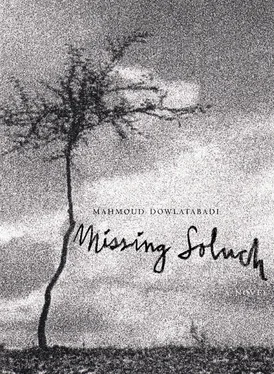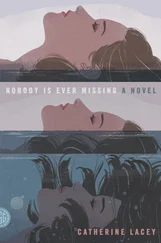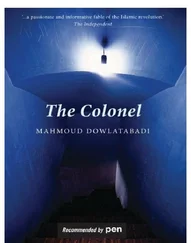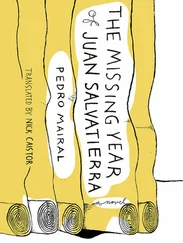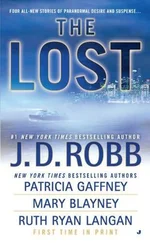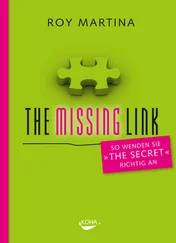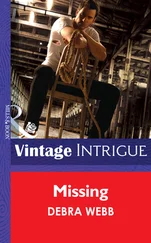Ghodrat’s father was sitting on a rock. The tractor-driver half-glanced over at the women from beneath his lowered cap. Abrau leapt up to the tractor and put a solid foot on the running board. The driver asked about Salar Abdullah, and Abrau told him they’d need to look for him at his farmland. The driver started up the tractor once again, and on the far side of the machine, Abbas spit at the deep, dusty tracks it left behind.
* * *
The commotion settled. The women each went their own way. Only Ghodrat’s father remained, sitting on the rock holding his head in his hands. Abbas turned and began walking toward the camels, which were following their habitual path to the outlying fields. Abbas was still in the middle of the settling dust, lost in his thoughts. All of his peers were leaving or had already left. Zaminej was emptying out. While they had been there, Abbas had rarely shared a feeling of camaraderie with them; indeed, usually he was at odds with most of them. But now that they had gone or were about to leave, he sensed their absence. Empty places, gaping holes, opened up in Abbas’ mind. Like anthills in soft soil, spaces cut into the dirt.
Abbas crushed an anthill with his foot and marched on. He looked again at his feet and saw grass. The open fields. Fields streaked with green glistening beneath the soft warmth of the morning sun. Wide-open lands, tended fields alongside wild lands stretching out into the distance. To reach the distant wild lands where the camels would graze, one had to carefully direct them between farmed fields. He began to gather the camels … “Hey, ho, hey!”
The wheat had just begun to sprout, a green carpet over the fields. The camels were not to enter the wheat fields, as even if they didn’t graze on it, they would crush and kill the plants beneath their hooves. The camels were still somewhat full from their morning provisions and so were not much tempted by the wheat stalks. They walked softly and calmly, free of their saddles, bridles, and gear. Camels are quick to sense this freedom, as is easy to see in their gait as they walk. Free of their saddles, they stride freely. They can choose to step lightly or heavily, in long or short steps, either trotting or walking. A camel can choose to stop in its tracks, turn its head over its shoulder, and look around; it can look anywhere and not just straight ahead. It can raise its tail and drop dung, unmuzzled and with nothing around its neck. When the camel’s tethered in a train, with one camel’s bridle tied closely to the next camel’s behind, it loses its individuality. It acts as if it’s bearing a load, even if there is none. That’s what the bridle and caravan leader tell it: don’t step out of line. Unless it is the lead camel, whose tether is handled by the caravan leader. Don’t wander. Walk, walk. The leader will lead the way …
But they were free. The Sardar’s camels were free in front of Abbas, untethered and without bridles, without anything, not even the bells or chimes that camels often wear. It was spring, and spring breaks the work habit of a camel. It may gallop or trot if it likes. It froths at the lips and there is a wild abandon in its eyes. Spring fever intoxicates.
Abbas had noticed spring fever in the camels over the past few days.
The black male was walking ahead of the others. It was not far to the grazing lands. By the time the sun was up three ticks, the camels would be in the wild lands. The sun was rising, and with it the daybreak’s first heat was dissipating. The air felt milder and milder. Abbas began to feel that his shoulder was sweating beneath the sack he was carrying. The sunlight on the red earth reflected against the woolly coats of the camels. Abbas waved his walking stick over his head and called out, “Hey hey hey … you bastard!”
The black male had turned on a mare camel. Abbas ran forward and brought a blow down on the temple of the male, who had grabbed the female’s throat in his teeth. Abbas brought down a second blow, and then another. The male let go of the mare and stared at Abbas. Froth was pouring from the edges of his mouth. With a shouted threat, Abbas pushed him forward and broke his stare. The black male camel fell in with the others and began walking ahead. Abbas walked along, calling at the herd.
Over the last few days, the look of the male camel had changed. He seemed unsettled, as if there was a trace of hatred or even anger in his actions. Abbas had sensed this. The male also disturbed the other camels. He would act aggressively toward them, biting at them for no reason. He would suddenly grab at them with his teeth, biting their legs or their ears. Abbas had been riled by this. He had to constantly separate this one camel from the others. With a few blows and by shouting he could eventually be made to let go of the other animal, but sometimes it would take forty blows to his head and legs before he would let go. Abbas was not so softhearted as to be bothered by hitting the animal. He was concerned more for himself in the situation, since this wasn’t easy work. Separating two camels, one of which acts drunken and tinged with madness, made him tired and irritable. He would end up sweating all over. Alone in the desert, he’d be exhausted and had to eat more of his bread and drink his water quickly. As a result, he’d return home twice as exhausted as usual and collapse in his bed like a corpse at night.
With the ascending sun, the herd entered the grazing lands. The scrub was long enough for them to eat, green and moist. Other than in spots, these lands were covered by wild shur , a kind of plant that only camels can eat while still green, but that could be used for feed for cattle if dried. In the spring and summer, men would gather the shur into bundles for feed for their donkeys and camels, stacking it in bundles alongside the outer wall of their homes. The plant would slowly dry up and lose its toughness while taking on some moisture from the rain, making it suitable for their sheep and goats. Some would pound the dried plant to collect its seeds for use in laundering clothes; this was called ajuvveh . But as long as it was still green and in the ground, the plant was only suitable for the camels; only their mouths could pull the plant out from the roots and eat it with its salty flavor. The camel’s store of water, perhaps, gave it a special ability to digest the plant inside its huge stomach.
Abbas let the camels go free in the field while he set down his sack and sat beside an ancient well.
This now-dry well was, as Abbas himself remembered, one of a chain of salt-water wells that were once connected underground. Before this system dried up, the water in it was used to power the old mill. Salt water is only useful for this, for turning the stone of the mill. But when the water level dropped, the mill also went out of use. And just before the old mill fell out of use, a new motorized mill was set up over in the village of Dehbid, taking over from Zaminej. People now had to take their wheat to this mill instead. So then the old salt-water mill’s doors were closed and the miller, old Shahmir, had migrated to Dehbid. There wasn’t much for him to do in Zaminej, and he’d gone blind by then as well. The times when Abbas helped his uncle Molla Aman with his peddling he’d sometimes see Shahmir in Dehbid, walking with one hand on a wall and a walking stick in the other, reciting old stories from the epic poems. If the women of Dehbid wanted, they would invite Shahmir into their homes for him to regale them with the old tales that only he knew from the poems.
Now Shahmir’s old mill, far away from the village, situated at the end of the underground channel linked by the salt-water wells, had fallen into disrepair. Broken, dry, and crumbling, the mill was half-covered by sand and rubble and was a haven for snakes and mice.
Читать дальше
